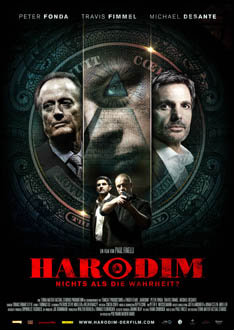
Starts November 8
Original language: English | German subtitles
 Terra Mater Factual Studios is releasing Harodim as a thriller, which might be justifiable cause for consternation. It is neither a thriller nor a documentary but crosses genre classifications. The plot’s structure is based on events in the USA on September 11, 2001; intertwining three characters’ lives adds fictional value. Beguiling, authentic newsreel footage serves the B-roll purpose. Relative to the heart of the story is that day’s impact domestically and abroad, the heroism and pain, theories of complicity and terrorism, conflicting information, baffling events, and questionable behavior by people in high places.
Terra Mater Factual Studios is releasing Harodim as a thriller, which might be justifiable cause for consternation. It is neither a thriller nor a documentary but crosses genre classifications. The plot’s structure is based on events in the USA on September 11, 2001; intertwining three characters’ lives adds fictional value. Beguiling, authentic newsreel footage serves the B-roll purpose. Relative to the heart of the story is that day’s impact domestically and abroad, the heroism and pain, theories of complicity and terrorism, conflicting information, baffling events, and questionable behavior by people in high places.
Lazarus Fell (Travis Fimmel), ex-Navy SEAL with secret operative expertise, “dies” to avenge his father’s death. His personal vendetta, with all its sacrifices, eventually leads him to Mr. D. (Michael Desante/Terrorist), who has been hiding “in plain sight” in Vienna, Austria. Fell’s agenda is revenge, whereas Mr. D. desperately wants Fell to know the deeply entrenched reasons, replete with innuendos, deceits, and manipulations that has been involved in “hoodwinking” the world: he and Fell are inconsequential—there is still the future. And time is running out. Then Solomon Fell (Peter Fonda), harbinger of past and future treatises for those chosen few who control, arrives.
This is not a thriller in the vernacular of today; the action takes place in an underground secret hide-a-way Fell has ferreted out and sophisticatedly equipped. Austrian director & writer Paul Finelli did not have to cherry-pick events—subterfuge does seem to surround that day in September. Challenging for the actors is that they are somewhat like props against the B-roll, i.e. non-fiction news footage spanning more than 50 years. The implied reference to a secret, string-pulling organization setting international policy over decades is nebulous: collegiate secret societies have existed since the mid-18th century in the US, predominantly for wealthy males and as hidden pathways to power; otherwise obscure societies have included the Illuminati, Freemasonry, Molly Maguires, Bataille, Milner group, etc. Historians and journalists over the past century have written about the increasingly significant role secret societies have globally. Depending on a viewer’s expectations, this European production will elicit love, hate, indifference or a probing interest, but it would be hard to refute, reality is stranger than fiction.
